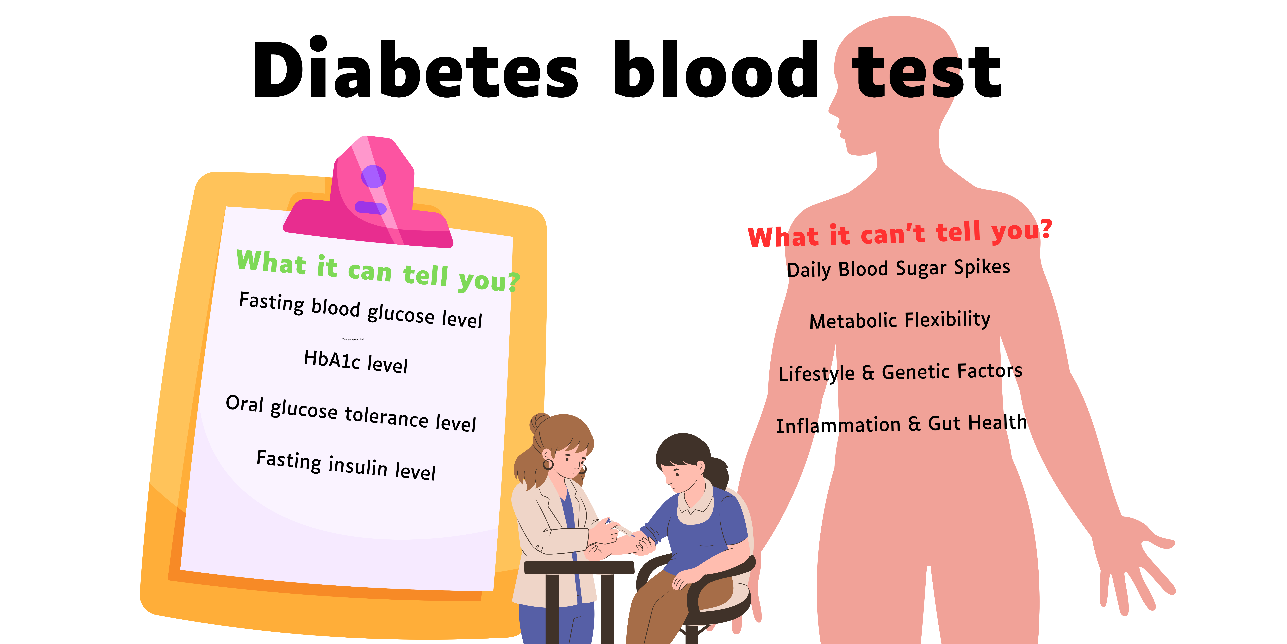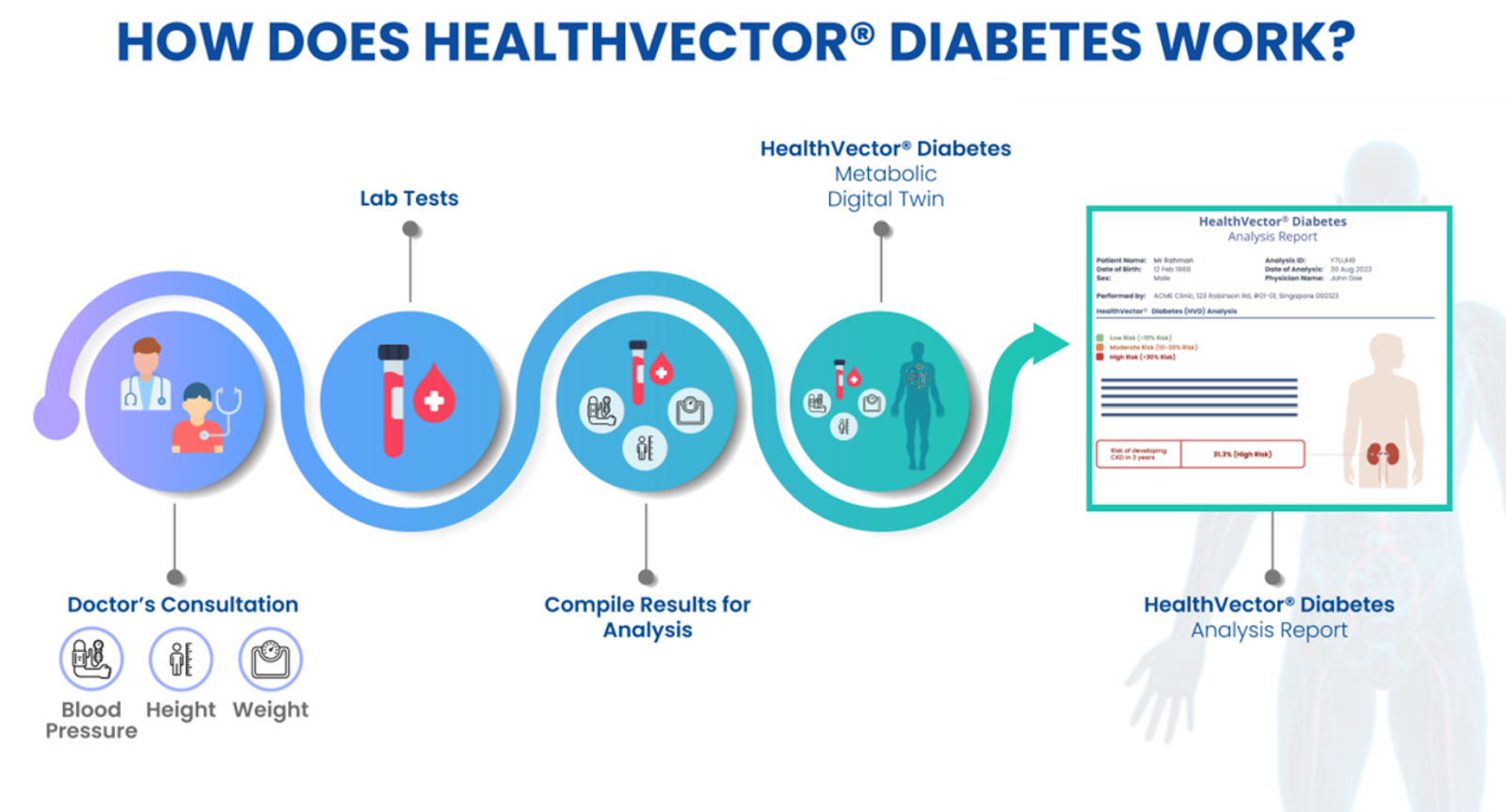.png)
Can a Blood Test Predict Your Risk for Diabetes?
The short answer is yes — but only partially.
With type 2 Diabetes and prediabetes on the rise worldwide, many people rely on blood tests to understand their metabolic health. Tests like fasting glucose and HbA1c can offer key insights into how your body processes sugar. However, they only paint part of the picture.
In this article, we break down what your blood test can reveal about your diabetes risk — and what it might miss. If you’re looking to take control of your health, this guide will help you to better understand the various diabetes blood tests and what they can reveal about your diabetes risk, and what they might miss.

1. Fasting Blood Glucose (FBG)
This test measures your blood sugar after 8–12 hours of fasting.
A normal FBG level means your body can regulate and utilize sugar levels efficiently. Elevated fasting glucose may suggest insulin resistance — a condition in which your cells don’t respond well to insulin, the main hormone that controls blood sugar levels. When this happens, sugar remains in the bloodstream instead of being absorbed by cells, increasing the risk of diabetes.
2. Hemoglobin A1c (HbA1c)
As we explained in our complete guide to understanding HbA1c, this test reflects your average blood sugar levels over the past 2–3 months. A higher HbA1c suggests chronically elevated blood glucose — one of the strongest indicators of diabetic control.
3. Oral Glucose Tolerance Test (OGTT)
This test assesses how your body processes glucose over time after drinking a sugary solution before the test. Even if your fasting glucose is normal, OGTT can detect impaired glucose tolerance — a condition often missed by other tests. It’s especially valuable for diagnosing gestational diabetes or early-stage insulin resistance.
4. Fasting Insulin & HOMA-IR
This test measures insulin levels and helps estimate insulin resistance using the HOMA-IR formula.
High insulin levels (even with normal blood sugar) can be an early warning sign that your body is overworking to maintain glucose control, as it shows that your body requires the release of more insulin to maintain your blood sugar at a normal level. This can be a potential precursor to diabetes.
While blood tests are powerful tools, they’re only one piece of the puzzle. Here’s what they might overlook:
1. Daily Blood Sugar Spikes
HbA1c shows averages — but not daily spikes or dips. You could experience frequent post-meal glucose spikes without it showing up in standard tests.
🔍 Consider using a Continuous Glucose Monitor (CGM) for real-time data on how your blood sugar might behave throughout the day.
2. Metabolic Flexibility
Can your body switch efficiently between burning carbs and fats for fuel?
Current blood tests are unable to measure this. Poor metabolic flexibility can lead to fatigue, stubborn weight gain, and increased diabetes risk — even if your test results look “normal.”
3. Lifestyle & Genetic Factors
No lab test can fully capture the impact of your diet, exercise, sleep, stress, or family history on your diabetes risk. Yet these factors play a critical role in determining your long-term diabetes risk.
4. Inflammation & Gut Health
Chronic inflammation and poor gut health have been shown in various studies to contribute to insulin resistance — but they are often overlooked in routine diabetes screenings.
🧬 Emerging research suggests that markers like CRP, gut microbiome analysis, and advanced lipid panels may offer deeper insights — but they're not yet standard practice.

At Mesh Bio, we’re transforming how chronic conditions like diabetes can be detected and managed. Our advanced AI-powered healthcare solutions, HealthVector® Diabetes software, offer personalized insights, advanced risk assessments, and data-driven support, empowering you and your healthcare team to make better decisions earlier. Using the personalized reports generated by software, you and your healthcare team can create a tailored treatment plan that better fits your individual needs, helping you to prevent potential complications and manage diabetes more effectively.
Key Features of HealthVector® Diabetes:
Ready to take charge of your metabolic health?
Learn more about our solutions by booking a Free Demo!
Understanding your blood test and managing your blood sugar level is one of the most crucial aspects of diabetes care. While your blood test offers a valuable snapshot of your health and identifies important red flags, it’s just one part of a comprehensive approach to diabetes prevention.
For the best results, combine lab data with lifestyle tracking, advanced testing, and personalized support. Let our HealthVector® Diabetes software be your companion in your health journey.
🎯 Stay informed. Stay proactive. Your health is in your hands.